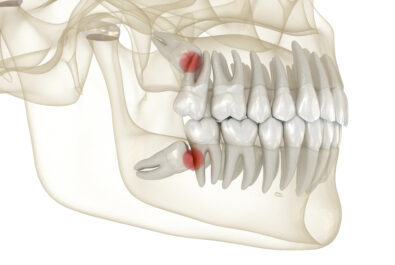Some high profile news stories emerged in the past two years detailing how apparently healthy young people have died as a result of routine third molar (wisdom tooth) extraction surgery. In most cases, the patient passed away as a result of an adverse reaction to the anesthetics or sedatives administered to manage discomfort during the procedure. While cases like these are devastating to the families affected, they are very rare. Understanding the risks associated with surgical procedures of all kinds and knowing what questions to ask your dentist prior to undergoing treatment are the best way to stay informed and safe.
Safety Concerns During Surgical Extraction of Third Molars
Your dentist or oral surgeon will only recommend removing the third molars if they pose a threat to the other teeth, damage the soft tissues, or pose a serious risk of decay, infection, or inflammation. Millions of wisdom teeth are removed in the U.S. every year, although those numbers have decreased in recent years, due to an overall move toward a more “wait and see” approach. Two problems that can occur during this type of oral surgery include:
Hypoxia (as a result of anesthesia)
Hypoxia literally means “lack of oxygen.” When a person is put under dental sedation or anesthesia, the muscles controlling the airway relax. If an obstruction, like excess throat tissue, blocks the airway, the brain is deprived of oxygen and could become damaged or die. The American Association for Oral and Maxillofacial Surgeons reports that the chances of a critical problem (such as brain damage or death) occurring while under anesthetics to be 1 in 365,534. Furthermore, a comprehensive review sponsored by the FDA and the NIH stated that anesthetics administered by a properly trained and certified professional have a “remarkable record of safety.”
Nerve damage
In rare cases, the inferior alveolar nerve or the lingual nerve (both of which run through the mandible or lower jaw) are injured during a wisdom tooth removal resulting in loss of sensation, discomfort, or tingling in the tongue, chin, teeth, gums, or lower lip. This type of nerve damage is usually temporary and fades over the course of a few weeks or months. In very rare cases, though, permanent nerve damage can occur.
About Shawn Hofkes, DDS
With advanced training in oral and maxillofacial surgery and certification in sedation dentistry, Shawn Hofkes, DDS has years of experience performing safe, comfortable wisdom tooth extractions from our comfortable, state-of-the-art dentist office in Cerritos, CA. We follow strict safety protocols and monitor our patients throughout their procedure, to ensure your safety and comfort. To schedule your appointment or consultation with Dr. Hofkes, contact us today. We proudly serve patients of all ages from Cerritos, Lakewood, Long Beach, Buena Park, and all surrounding communities.














